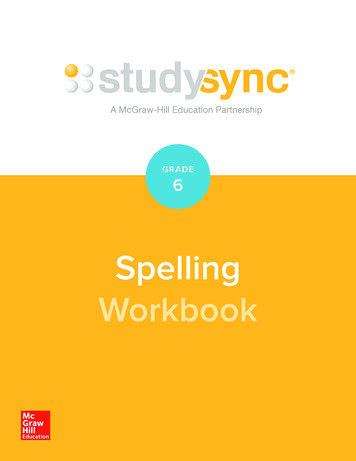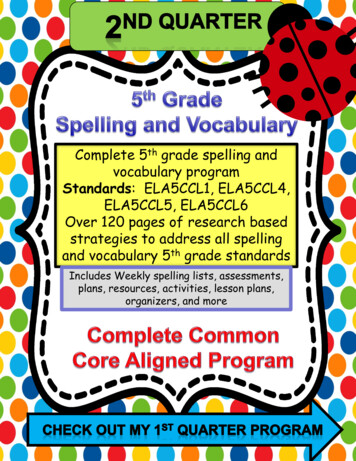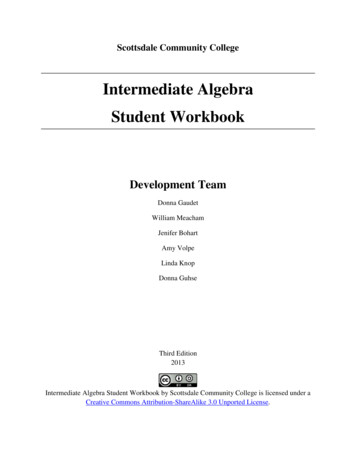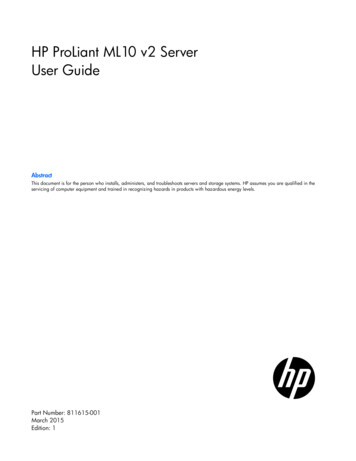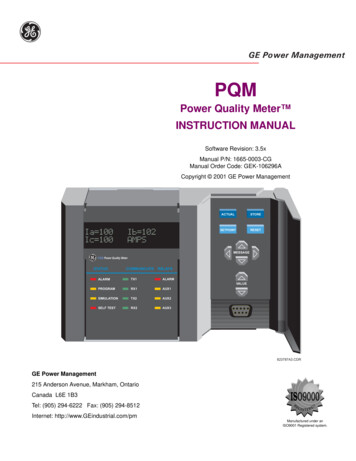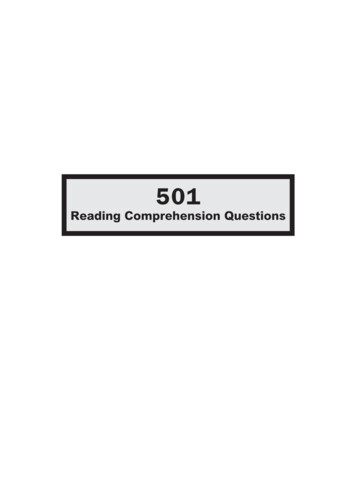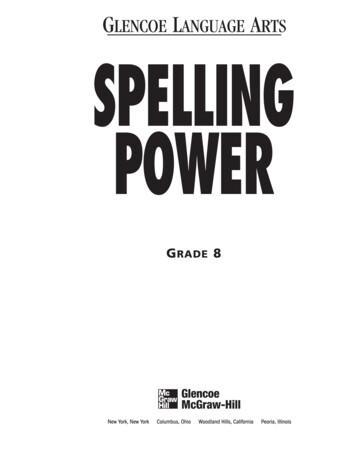
Transcription
GLENCOE LANGUAGE ARTSSPELLINGPOWERG RADE 8
To the StudentThis Spelling Power workbook provides the practice you need to improve your spelling andwriting ability and to expand your vocabulary. Each spelling lesson focuses on a single spellingpattern or concept that applies to a list of words in a Word Bank. You then have severalopportunities to practice what you’ve learned: writing the words, using them in sentences,recognizing and correcting them as you proofread, and applying the spelling pattern or concept to new words that follow the same pattern. If you have trouble with an exercise, you canalways go back to the Word Bank and Key Concepts discussion, review the material, and thenreturn to the exercise.You can keep track of your own progress and achievement in spelling by using the StudentProgress Chart, which appears on page v. With your teacher’s help, you can score your workon any lesson, quiz, or test. After you know your score, use the Scoring Scale on pages vi–viito figure your percentage. Then mark your score (or percentage correct) on the StudentProgress Chart. Share your Progress Chart with your parents or guardians as your teacherdirects.Copyright by The McGraw-Hill Companies, Inc. All rights reserved. Except as permitted under theUnited States Copyright Act of 1976, no part of this publication may be reproduced or distributed in anyform or means, or stored in a database or retrieval system, without the prior written permission of thepublisher.Send all inquiries to:Glencoe/McGraw-Hill8787 Orion PlaceColumbus, Ohio 43240ISBN 0-07-826242-9Printed in the United States of America1 2 3 4 5 6 7 8 9 10 024 04 03 02 01Copyright by The McGraw-Hill Companies, Inc.Glencoe/McGraw-Hill
CONTENTSStudent Progress Chart . . . . . . . . . . . . . . . . . . . . . . . . . . . . . . . . . . . . . . . . . . . . . . . . . . . . . . . . . . . . . . . . . . . . . . vScoring Scale . . . . . . . . . . . . . . . . . . . . . . . . . . . . . . . . . . . . . . . . . . . . . . . . . . . . . . . . . . . . . . . . . . . . . . . . . . . . . viUnit 1Lesson 1: Short Vowel Spellings . . . . . . . . . . . . . . . . . . . . . . . . . . . . . . . . . . . . . . . . . . . . . . . . . . . . . . . . . . . . . . 1Lesson 2: Long Vowel Spellings . . . . . . . . . . . . . . . . . . . . . . . . . . . . . . . . . . . . . . . . . . . . . . . . . . . . . . . . . . . . . . . 3Lesson 3: Double Consonants . . . . . . . . . . . . . . . . . . . . . . . . . . . . . . . . . . . . . . . . . . . . . . . . . . . . . . . . . . . . . . . . 5Lesson 4: Silent Consonants . . . . . . . . . . . . . . . . . . . . . . . . . . . . . . . . . . . . . . . . . . . . . . . . . . . . . . . . . . . . . . . . . 7Review Lessons 1–4 . . . . . . . . . . . . . . . . . . . . . . . . . . . . . . . . . . . . . . . . . . . . . . . . . . . . . . . . . . . . . . . . . . . . . . . . 9Unit 2Lesson 5: Spelling the \ô\ Sound . . . . . . . . . . . . . . . . . . . . . . . . . . . . . . . . . . . . . . . . . . . . . . . . . . . . . . . . . . . . . 11Lesson 6: Spelling the Schwa Sound \ \ . . . . . . . . . . . . . . . . . . . . . . . . . . . . . . . . . . . . . . . . . . . . . . . . . . . . . . . 13Lesson 7: The “Seed” Sound . . . . . . . . . . . . . . . . . . . . . . . . . . . . . . . . . . . . . . . . . . . . . . . . . . . . . . . . . . . . . . . . 15Lesson 8: Words with ie and ei . . . . . . . . . . . . . . . . . . . . . . . . . . . . . . . . . . . . . . . . . . . . . . . . . . . . . . . . . . . . . . 17Review Lessons 5–8 . . . . . . . . . . . . . . . . . . . . . . . . . . . . . . . . . . . . . . . . . . . . . . . . . . . . . . . . . . . . . . . . . . . . . . . 19eUnit 3Lesson 9: Doubling the Final Consonant . . . . . . . . . . . . . . . . . . . . . . . . . . . . . . . . . . . . . . . . . . . . . . . . . . . . . . . 21Lesson 10: Dropping the Final Silent e . . . . . . . . . . . . . . . . . . . . . . . . . . . . . . . . . . . . . . . . . . . . . . . . . . . . . . . . 23Lesson 11: Keeping the Final Silent e . . . . . . . . . . . . . . . . . . . . . . . . . . . . . . . . . . . . . . . . . . . . . . . . . . . . . . . . . 25Lesson 12: The Final y . . . . . . . . . . . . . . . . . . . . . . . . . . . . . . . . . . . . . . . . . . . . . . . . . . . . . . . . . . . . . . . . . . . . . 27Review Lessons 9–12 . . . . . . . . . . . . . . . . . . . . . . . . . . . . . . . . . . . . . . . . . . . . . . . . . . . . . . . . . . . . . . . . . . . . . . 29Unit 4Lesson 13: The Suffixes -ize, ise, -yze . . . . . . . . . . . . . . . . . . . . . . . . . . . . . . . . . . . . . . . . . . . . . . . . . . . . . . . . . 31Lesson 14: The Suffixes -ary and -ory . . . . . . . . . . . . . . . . . . . . . . . . . . . . . . . . . . . . . . . . . . . . . . . . . . . . . . . . . 33Lesson 15: The Suffix -ion . . . . . . . . . . . . . . . . . . . . . . . . . . . . . . . . . . . . . . . . . . . . . . . . . . . . . . . . . . . . . . . . . . 35Lesson 16: The Suffix -ous . . . . . . . . . . . . . . . . . . . . . . . . . . . . . . . . . . . . . . . . . . . . . . . . . . . . . . . . . . . . . . . . . . 37Review Lessons 13–16 . . . . . . . . . . . . . . . . . . . . . . . . . . . . . . . . . . . . . . . . . . . . . . . . . . . . . . . . . . . . . . . . . . . . . 39Unit 5Lesson 17: The Suffixes -ible and -able . . . . . . . . . . . . . . . . . . . . . . . . . . . . . . . . . . . . . . . . . . . . . . . . . . . . . . . . 41Lesson 18: Adding Prefixes . . . . . . . . . . . . . . . . . . . . . . . . . . . . . . . . . . . . . . . . . . . . . . . . . . . . . . . . . . . . . . . . . 43Lesson 19: Assimilated Prefixes . . . . . . . . . . . . . . . . . . . . . . . . . . . . . . . . . . . . . . . . . . . . . . . . . . . . . . . . . . . . . . 45Lesson 20: The Prefixes sub- and super- . . . . . . . . . . . . . . . . . . . . . . . . . . . . . . . . . . . . . . . . . . . . . . . . . . . . . . . 47Review Lessons 17–20 . . . . . . . . . . . . . . . . . . . . . . . . . . . . . . . . . . . . . . . . . . . . . . . . . . . . . . . . . . . . . . . . . . . . . 49Unit 6Lesson 21: The Latin Word Roots duc and port . . . . . . . . . . . . . . . . . . . . . . . . . . . . . . . . . . . . . . . . . . . . . . . . . . 51Lesson 22: The Latin Word Roots mort and vit/viv . . . . . . . . . . . . . . . . . . . . . . . . . . . . . . . . . . . . . . . . . . . . . . . 53Lesson 23: The Latin Word Roots bene and mal . . . . . . . . . . . . . . . . . . . . . . . . . . . . . . . . . . . . . . . . . . . . . . . . 55Lesson 24: Words Often Confused . . . . . . . . . . . . . . . . . . . . . . . . . . . . . . . . . . . . . . . . . . . . . . . . . . . . . . . . . . . 57Review Lessons 21–24 . . . . . . . . . . . . . . . . . . . . . . . . . . . . . . . . . . . . . . . . . . . . . . . . . . . . . . . . . . . . . . . . . . . . . 59Spelling PowerGrade 8iii
Unit 7Lesson 25: Plurals of Nouns Ending in a Consonant o . . . . . . . . . . . . . . . . . . . . . . . . . . . . . . . . . . . . . . . . . . 61Lesson 26: Plurals of Nouns Ending in a Vowel o . . . . . . . . . . . . . . . . . . . . . . . . . . . . . . . . . . . . . . . . . . . . . 63Lesson 27: Plurals of Nouns Ending in s, ch, sh, x, and z . . . . . . . . . . . . . . . . . . . . . . . . . . . . . . . . . . . . . . . . . . 65Lesson 28: Plurals of Nouns Ending in f and fe . . . . . . . . . . . . . . . . . . . . . . . . . . . . . . . . . . . . . . . . . . . . . . . . . . 67Review Lessons 25–28 . . . . . . . . . . . . . . . . . . . . . . . . . . . . . . . . . . . . . . . . . . . . . . . . . . . . . . . . . . . . . . . . . . . . . 69Unit 8Lesson 29: Unusual Plurals . . . . . . . . . . . . . . . . . . . . . . . . . . . . . . . . . . . . . . . . . . . . . . . . . . . . . . . . . . . . . . . . . 71Lesson 30: Spelling Possessive Forms . . . . . . . . . . . . . . . . . . . . . . . . . . . . . . . . . . . . . . . . . . . . . . . . . . . . . . . . . 73Lesson 31: Compounds . . . . . . . . . . . . . . . . . . . . . . . . . . . . . . . . . . . . . . . . . . . . . . . . . . . . . . . . . . . . . . . . . . . . 75Lesson 32: Easily Misspelled Words . . . . . . . . . . . . . . . . . . . . . . . . . . . . . . . . . . . . . . . . . . . . . . . . . . . . . . . . . . 77Review Lessons 29–32 . . . . . . . . . . . . . . . . . . . . . . . . . . . . . . . . . . . . . . . . . . . . . . . . . . . . . . . . . . . . . . . . . . . . . 79ivGrade 8Spelling Power
STUDENT PROGRESS CHARTFill in the chart below with your scores, using the scoring scale on the next page.Name:LessonPretestOral QuizUnit 132ReviewSpelling PowerGrade 8v
SCORING SCALEUse this scale to find your score. Line up the number of items with the number correct. For example, if 15out of 16 items are correct, your score is 93.7 percent (see grayed area).Number of ItemsNumber e .764.562.560.658.857.155.65452.651.350Spelling Power
Number of ItemsNumber .989.587.28510097.294.692.189.787.5Spelling Power363738394010097.3 10094.7 97.3 10092.3 94.9 97.4 10090 92.5 95 97.5 100Grade 8 vii
Name Date Class Lesson 1: Short Vowel SpellingsWord cheliteralvalidcriminalenhanceKey Concepts1. Short vowel sounds are often spelled with single vowel letters.comicbankrupt2. Short vowel sounds include \a\ as in hat, \e\ as in net, \i\ as in did, \o\ as in lot, and \u\ as in cup.Spelling PracticedChoose the word from the Word Bank defined by each phrase. Write your choices on the lines.Then circle the short vowel(s) that you hear in each word.1. hair on the upper lip2. helper in crime3. to hinder or a container for dirty clothes4. related to crime or person committing crimesCopyright by The McGraw-Hill Companies, Inc.5. habit of seeing the best in things6. acting without forethought7. to distribute8. to increase or improve9. logically sound, accurate, or effective10. according to dictionary definitionsSpelling PowerGrade 81
Name Date Class LESSON 1 continuedSpelling in ContextdWrite the word from the Word Bank that best fits in each “Tom Swiftie” pun below. Use the KeyConcepts to help you spell short vowel sounds correctly.1. “This vending machine doesn’tapples or oranges,” said Tom fruitlessly.2. “I can wash all the clothes in myTom cheerfully.now that I have a whole box of detergent,“ said3. ”It’s hard to feelabout Chicago’s football team,“ said Tom bearishly.4. ”You caught me, Officer; I admit that I’m a(n)5. ”No one else is with me. My,“ said Tom crookedly.has the day off,“ Tom continued helplessly.Proofreading PracticedRead the paragraph. Find the five misspelled words and circle them. Then, on the numbered linesbelow, write the correct spelling for each circled word.Archaeologist Yuan Zhongyi made what seemed an impulsave decision in 1974. Assumingthat a farmer’s far-fetched claims were valed, Yuan started a dig in a remote Chinese field.Soon he had leteral proof that a two-thousand-year-old legend was true. He found a buriedarmy of life-sized clay soldiers guarding the tomb of China’s first emperor. Each soldier wasunique, even down to the mustaiche. Yuan’s work continues to anhance our knowledge of theancient world.3.2.4.5.Spelling ApplicationdListed below are five additional words that follow the short-vowel patterns you have learned. Writeeach word on the line and circle the short vowel or vowels. Then on a separate piece of paper,create acrostics for the five words. For each acrostic, choose words or phrases reflecting the meaningof the spelling word. Check a dictionary if necessary. Look at the example to help you get started.Example: c o m i c scolorfuloutrageousmaking us laughin the newspapercreativeSunday funnies1. astronomical4. fragment2. budget5. monstrosity3. emphasis2Grade 8Spelling PowerCopyright by The McGraw-Hill Companies, Inc.1.
Name Date Class Lesson 2: Long Vowel SpellingsWord tuallydehydratedbuttegyrateeuphoniumKey ConceptsLong vowel sounds can be spelled with vowel combinations as well as with single vowels. The \ \ sound can be spelled ai, ay, or a e. The \ \ sound can be spelled oa, ow, o, or o e.stainplayfulgraperoadblowalsoclose The \ƒ\ sound can be spelled ea, ee, e, y, or e e. The \ \ sound can be spelled ou, ew, eu, u, ue,reachseekdecalor u e.fewfeudusualmelodycompetecouponcuteTuesday The \ª\ sound can be spelled i, y, or i e.bi asskyprizeSpelling PracticedCopyright by The McGraw-Hill Companies, Inc.Write the words from the Word Bank in alphabetical order. Circle the letters that spell the longvowel sound(s) in each word.attainExample:1.6.2.7.3.8.4.9.5.10.Spelling PowerGrade 83
Name Date Class LESSON 2 continuedSpelling in ContextdIn each sentence, a word is missing. Write the correct word from the Word Bank on the line. Usethe Key Concepts to help you spell the words correctly.1. After hiking for an hour in the desert, we began to feel2. We watched a pair of hawks swoop and.in a cloudless sky.3. We cut across a sandy canyon, hoping not toon private property.4. As a jackrabbit bounded off, we wondered where it found enough water tolife.5. Back at camp, we found the taste of cool lemonade far from.Proofreading PracticedRead the paragraph. Find the five misspelled words and circle them. Then, on the numbered linesbelow, write the correct spelling for each circled word.Were his dreams of climbing Mount McKinley just overblone fantasies? Climbing a butemight have challenged some people, but Erik Weihenmayer intended to go up the mountain.Although Weihenmayer had been blinded at thirteen, he was sure that the climb was fesible.Already an experienced climber, he began the ascent of McKinley with a party of sightedclimbers. By mootually supporting one another, they succeeded. Weihenmayer becamethe first blind man ever to reach McKinley’s 20,320-foot peak. He wished he could blow auphonium to spread the news.3.2.4.5.Spelling ApplicationdBelow are five additional words that follow the long-vowel spelling patterns you have learned.Circle the letters that spell long-vowel sounds in these words. Then, using each word once, fill in theimaginary book titles.futilemotivatenotable1. Insects Can Help Your Garden2. How to3. Lost in the Wilderness: My4.thrive, by Leigh D. BugYourself for Success, by U. K. N. Dooit, by Sir Vyval F. D. FittessIdeas That Brighten the Mind, by N. Spur Ayshon5. Little-Known Feats and4ordealGrade 8Facts, by Hooda ThunkittSpelling PowerCopyright by The McGraw-Hill Companies, Inc.1.
Name Date Class Lesson 3: Double ConsonantsWord Key Concepts1. Double consonants often follow short vowel sounds.mottoillness2. Double consonants usually represent a single unit ofsound.naggingoccupy3. Sometimes double consonants represent twounits of sound.succeed (\k\ and \s\)fishhook (\sh\ and \h\)Spelling PracticedCopyright by The McGraw-Hill Companies, Inc.List the words from the Word Bank in alphabetical order. Circle the vowel or vowel pair thatprecedes each set of double consonants. If the double consonants represent one unit of sound, write1. If they represent two units of sound, write 2.accept, 2Example:1.6.2.7.3.8.4.9.5.10.Spelling in ContextdDecide which word from the Word Bank is defined by each phrase below. Write the word on theline. Refer to the Key Concepts to help you spell each word correctly.1. to refuse to buy, sell, or use a product2. written or printed series of questions3. to represent a thing as greater than it is4. causing horror; shocking; dreadful5. to have or make room forSpelling PowerGrade 85
Name Date Class LESSON 3 continuedProofreading PracticedRead the paragraph. Find the five misspelled words and circle them. Then, on the numbered linesbelow, write the correct spelling for each circled word.Exentric was a word often used to describe Lady Mary Wortley Montagu, a woman far aheadof her time. Born in 1689, Lady Mary was considered odd because of her brilliant mind. Didshe embaras her husband, a government diplomat, by traveling with him to Turkey? OtherEnglishwomen of her era aparently disdained visiting that ”heathen“ land. Lady Mary foundthat Turkey had much to recomend it. There she learned how to vacinate children againstsmallpox, a practice that she later pioneered in England.1.4.2.5.3.Spelling ApplicationdListed below are eight additional words. Circle the double consonants in each. Write 1 after eachword whose double consonants represent one unit of sound and 2 after each word whose doubleconsonants represent two units of sound. Then use the words to fill in the crossword nty1Across3. an important event7. to keep something back8. a promise of soundness or performance23456786Grade 8Spelling PowerCopyright by The McGraw-Hill Companies, Inc.Down1. one who replaces someone else in office2. a situation involving a difficult choice4. to be present5. needed or required6. a state of mind or a feeling about somethingnecessarywithhold
Name Date Class Lesson 4: Silent ConsonantsWord entacquaintanceknollmortgagepneumoniaKey Concepts1. Some silent consonants reflect earlier Englishpronunciations. In Middle English, the k in kneewas sounded. Modern English drops the \k\sound but keeps the spelling.acknowledgement knoll2. Some silent consonants reflect patterns of otherlanguages. Psychic comes from Greek psyche,”soul.“ English speakers find \ps\ and \k\ hardto pronounce, so English drops the \p\ and \h\sounds but keeps the spelling.psychology3. Look for common letter combinations that include asilent letter. Some of these combinations include thefollowing: cq (drop the \k\ sound); pn (drop the \p\sound); sc (the letters sound a single \s\); bt (dropthe \b\ sound).acquaintance pneumonia descend subtle4. Some words end with a silent letter. In debut, the t isnot sounded.debut5. Other words you should commit to memory.mortgage adjournSpelling PracticedCopyright by The McGraw-Hill Companies, Inc.Choose the word from the Word Bank that comes from each source shown below. Write yourchoices on the lines. Circle the silent consonants in the words you write.1. Greek psyche, ”soul,“ logy, ”study“2. Greek pneumonia, ”lung disease,“ from pneuma, ”wind, breath“3. Old French mort, ”death,“ gage, ”pledge“4. Latin de, ”down,“ scandere, ”to climb“5. Old French ad, ”to,“ jour, ”day“6. Latin subtilis, ”thin, fine“7. Old English cnoll, ”mound, small hill“8. Old French acointier, ”to familiarize“9. Old English ad, “toward,“ cnawan, ”to know“10. French debuter, ”to make a first move in a game,“ from de, ”away“ but,”goal“Spelling PowerGrade 87
Name Date Class LESSON 4 continuedSpelling in ContextdFill in each tongue twister with the word whose sound is shown. As you write the words, rememberto include silent consonants.1. Cynthia cycles to college \sª kol′ e jƒ\classes.2. Why did mournful Morgan Jordan \môr′ gij\3. No \n l\Mort George’s morgue?now known’s so swiftly mown.4. Would a judge \‰ jurn′\a germy jury?5. Moe noted numerous, new \n» m n′ y‰\patients.Proofreading PracticedRead the paragraph. Find the five misspelled words and circle them. Then, on the numbered linesbelow, write the correct spelling for each circled word.If you know of Ben Franklin’s strong aquaintance with music, you may wonder if he inventedany musical instruments. Sure enough, in 1764 Franklin’s ”glass armonica“ made its debeu. Itsgraduated glass bowls of water spun as a pedal was pumped. When players held their fingers tothe glass rims, musical tones would rise or desend. The resulting melodies and chords were suttleand beautiful. Acnowledgement of Franklin’s artistry came from Mozart, who composed twopieces for the glass armonica.1.3.2.4.5.Shown below are five additional words with silent consonant patterns that you have learned.Unscramble each set of letters to correctly spell the word it represents. Then circle the silentconsonants in each word that you have tlety1. telytubs2. claitutaq3. sattiphirscy4. gincandes5. cemutapin8Grade 8Spelling PowerCopyright by The McGraw-Hill Companies, Inc.Spelling Applicationd
Name Date Class Unit 1: Review Lessons ngexaggerateliteralsustainFill in the word from the list above that best completes each sentence.1. The hotel could notany additional guests.2. Alice waited for the machine tosoda.3. Public television stations throughout the U.S. mailed ato their viewers.4. Candace would like somefor her hard work.5. People who act in unique and unusual ways are often described as6. The teacher tells jokes toher students’ interest during long classes.7. There is a sycamore tree growing on the8. Sometimes my spelling is.9. Watching TV will notCopyright by The McGraw-Hill Companies, Inc.your progress on your homework.10. Walking from San Francisco to Paris is not.For each phrase below, write the word from the list above that best fits the ptimismimpulsiverecommendliteralmutually11. tell a “fish story”12. to hold back or a laundry basket13. free-spirited14. “Pleased to make your.”15. anticipating the best16. “The court will now.”17. suggest, as at a restaurant18. “They reached an agreement.”19. actual20. opposite of ascendSpelling PowerGrade 89
Name Date Class Proofreading ApplicationLessons 1–4Read the following advice column. Find the twenty misspelled words and circle them. Then, on thenumbered lines below, write the correct spelling for each circled word.Dear Gabby,My disagreable neighbor barges in andeats all my potato chips. When I ask him notto encroche on my property, he laughs andmakes fun of my mustash. Should I shave itoff?Signed, Fuzzy FaceDear Fuzzy,Don’t shave, don’t be embarased, anddon’t be suttle with this crimenal nuisance.Lock your door and lock up the chips.Dear Gabby,My cable TV costs are so high that I’mgoing to have to morgage the house to paythem. Even with the cable, the TV works onlyif I gyrait the rabbit ears. Should I boycot thecable company?Signed, Tube .10.20.10Grade 8Dear Gabby,I am six years old. My doctor and heracomplice gave my parents a questionaireabout the shots I’ve had. Now they want tovacsinate me against all kinds of things. Saveme!Signed, DesperateDear Desperate,Look at this situation with optomism. Youdon’t want to get all dehidrated from the fluor get neumonia, do you? Ask your parents touse psycology. If they offer you a reward, youmay not even notice the shots.Copyright by The McGraw-Hill Companies, Inc.1.Dear Troubles,Your complaint sounds valed. This cablecompany aparently has overblone rates andunderdone service. Quick—before the debu ofthe new fall shows—grab the Yellow Pagesand find a better deal.Spelling Power
Name Date Class Lesson 5: Spelling the \ô\ SoundWord ghtyautomationdiscordfraudulentendorsedKey Concepts1. The \ô\ sound is spelled au or aw in most words.3. The \ôr\ sound is spelled or or oar in manywords.for mcoarseAugustawfulfaultdrawn2. The \ô\ sound is spelled a, augh, or ough insome words.haltdaughter oughtSpelling PracticedCopyright by The McGraw-Hill Companies, Inc.Put the words from the Word Bank in alphabetical order. Circle the letters that spell the \ô\ or \ôr\sound in each word.1.6.2.7.3.8.4.9.5.10.Spelling in ContextdWrite the word from the Word Bank that fits in each “terse verse” rhyme. Refer to the KeyConcepts to help you spell the words correctly.Example:terrible breakfast treat: al waffleAnswer: awful waffle1. paid no attention to disharmony: ignored d2. dishonest purpose: fdt intent3. ungainly in reverse: ad backward4. vain and scornful Dorothy: hy Dotty5. mechanism to make sprinklers work by themselves: irrigationaSpelling PowernGrade 811
Name Date Class LESSON 5 continuedProofreading PracticedRead the paragraph. Find the five misspelled words and circle them. Then, on the numbered linesbelow, write the correct spelling for each circled word.What was killing the lions of Tanzania? As distroght rangers at Serengeti National Parkwatched helplessly, the tauwny cats ranging the savannah would mysteriously fawlter and die.Was their water supply polluted? Had the thotlessness of tourists introduced a deadly disease?The government quickly endoursed a study. Results were surprising: the lions had distemper,carried by local villagers’ dogs. By inoculating dogs, rangers could save the lions.1.4.2.5.3.Spelling ApplicationdListed below are ten additional words that follow the patterns you have learned. Fill in each wordnext to its definition. Then circle the letters that spell the \ô\ or \ôr\ orse1. related to hearingdferft6. planned aheade7. gaudy and cheapd8. failure to perform or to paydr10. using water pressureyGrade 8tl9. created or shaped12Copyright by The McGraw-Hill Companies, Inc.r4. attorney5. filled or ladenglorifywroughty2. to honor or praise3. regretfraughttawdrytiSpelling Power
Name Date Class Lesson 6: Spelling the Schwa Sound \ \eWord esuperficialadmirablecolossalmanagersaturateKey Concepts1. The schwa (‰) represents an indistinct vowelsound in unstressed syllables.2. Any unstressed vowel may spell the \‰\ sound.aboveite medi fygallo ncactus3. The \‰l\ sound may be spelled al, el, il, ol, ul, or le.trialjeweltendrilv
This Spelling Power workbook provides the practice you need to improve your spelling and writing ability and to expand your vocabulary. Each spelling lesson focuses on a single spelling pattern or concept that applies
